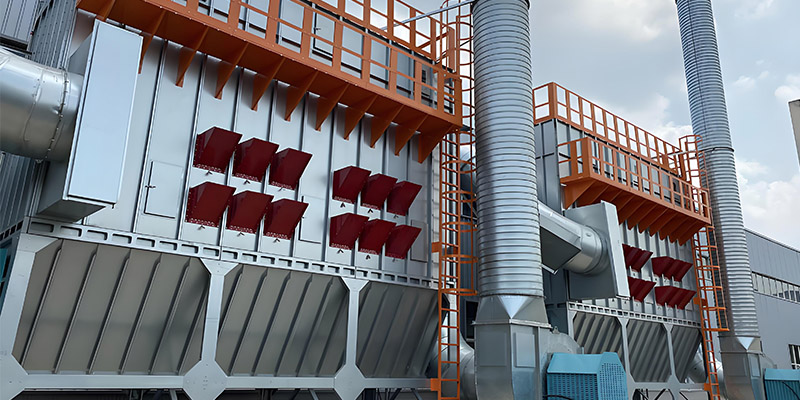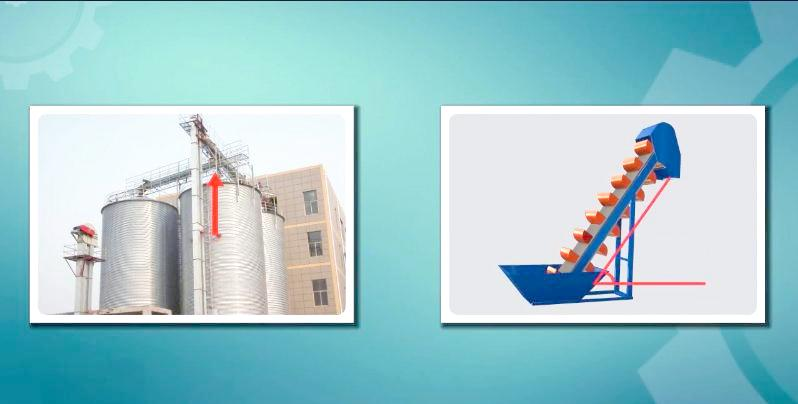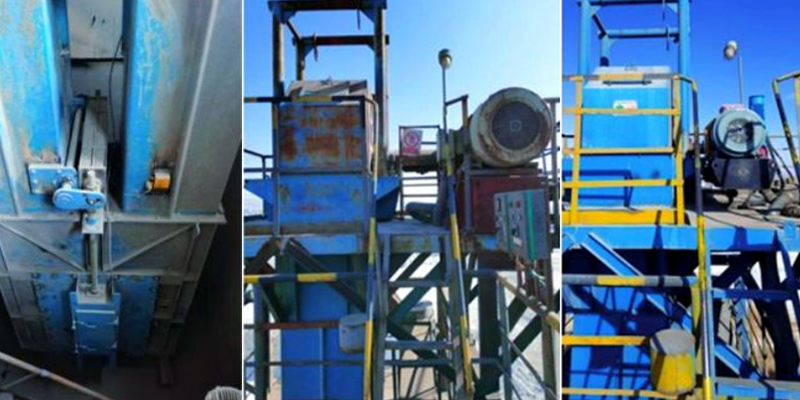Dust control is vital in industrial settings. It keeps the workplace clean and protects worker health. However, in many industries, certain dusts are more than just dirt. They are a potential bomb. When fine dust particles mix with air and reach a certain concentration, they can cause a devastating Dust Explosion. An explosion proof dust collector is a special piece of equipment designed to meet this serious challenge.
What is an Explosion Proof Dust Collector?
Simply put, an explosion proof dust collector is an industrial cleaning system. It has special designs and safety features. Its main goal is not just to collect dust. It must prevent explosions when collecting Combustible Dust. It also must control and minimize damage if an explosion happens.
This makes it very different from a standard dust collector. A normal collector can cause a dust explosion. Sparks from static electricity, overheating from friction, or an outside flame can trigger it. An explosion proof dust collector uses a complete Dust Collector Explosion Protection system to remove these risks.
How Explosion Protection Works: Stopping Danger Before It Starts
An explosion proof dust collector does not rely on one single safety feature. Instead, it uses multiple layers of protection. The core mechanisms include:
1. Preventive Measures: Removing the Conditions for an Explosion
-
It controls dust concentration. The system uses optimized airflow and constant suction. This keeps the dust concentration inside the collector and connected pipes well below the explosion limit.
-
It removes ignition sources.
-
Anti-static design: The filter bags or cartridges use conductive materials. The entire unit also has proper grounding. This prevents static electricity from building up and creating sparks.
-
Explosion-proof motors and electronics: All motors, switches, and lights have explosion-proof ratings. This ensures they cannot create sparks or hot surfaces that could ignite the dust.
-
It prevents metal collisions: Magnetic separators or non-sparking materials at the air inlet stop metal objects from entering and hitting the fan, which causes sparks.
-
2. Protective Measures: Controlling the Explosion’s Outcome
If prevention fails and an explosion happens, the protection system activates immediately. It saves the equipment and personnel. Common standards like ATEX for dust collectors often require these measures.
-
Explosion Venting: The collector housing has explosion vents or panels. When the internal pressure rises quickly, these panels burst first. They direct the flame and pressure to a safe area, which protects the main body of the collector.
-
Explosion Suppression: Highly sensitive pressure sensors detect the start of an explosion. Then, the system instantly releases a suppressing chemical into the container. This action extinguishes the flame in milliseconds and stops the explosion.
-
Explosion Isolation: This system uses isolation valves. These valves stop the flame and pressure wave from traveling through the ducts to other parts of the factory. This prevents a secondary, often more damaging, explosion.
What is the ATEX Standard?
ATEX is a European Union directive for equipment in potentially explosive atmospheres. An ATEX dust collector meets all the safety requirements of this directive. It is certified for safe use in designated hazardous areas. Designing and installing atex dust extraction systems is a mandatory compliance requirement for many companies exporting to those markets.
Key Reasons to Use One: Why Your Factory Might Need It
Three main factors drive companies to invest in explosion proof dust collectors:
-
Safety and Compliance: Occupational Safety and Health administrations have strict rules for handling Combustible Dust. Using non-protected equipment is a serious violation.
-
Asset Protection: A single dust explosion can destroy a production line or an entire facility. This equipment is crucial insurance for your assets.
-
Business Continuity and Reputation: The production stoppage and brand damage from an explosion are immense.
Common Applications: Which Industries Need Them Most?
Explosion proof dust collectors are critical in many industries that handle Combustible Dust, for example:
-
Metal Processing: Aluminum powder, magnesium powder, titanium powder.
-
Food & Feed: Sugar, flour, starch, milk powder.
-
Woodworking: Wood chips and sawdust.
-
Chemicals & Plastics: Resins, pigments, pharmaceutical powders.
-
Energy & Power: Coal dust.
-
Cement Industry: While finished cement is not explosive, the production process creates combustible dust from coal and raw material grinding. Therefore, a cement plant dust collector often needs explosion-proof features.
How to Choose the Right Explosion Proof Dust Collector
Selecting the right explosion proof dust collector requires looking at several factors. The table below helps guide your decision:
| Factor to Consider | Details and Questions to Ask |
|---|---|
| Dust Properties | What is your dust? Know its ignition temperature, explosion severity, and minimum ignition energy. This is the foundation for the design. |
| Process Needs | What airflow volume do you need? Will it run continuously or in batches? This decides the unit’s size. |
| Explosion Certification | Do you need to meet specific standards like ATEX or NFPA? |
| Installation Environment | Will you install it indoors or outdoors? Are there space limits? This affects venting direction. |
| Equipment Type | For mobility, choose a central system or a portable explosion proof dust collector. For technology, choose an explosion-proof version of a bag filter or cartridge collector. |
| Protection Mechanism | Based on your risk assessment, decide between venting, suppression, isolation, or a combined approach. |
| Integration & Maintenance | How will it connect to your current conveying equipment? Is filter change and cleaning easy? |
The Main Advantages of Explosion Proof Dust Collectors
When you invest in professional explosion proof dust collectors, you get:
-
Unmatched Safety: They drastically reduce the risk of a catastrophic dust explosion. This protects your employees’ lives.
-
Regulatory Compliance: You easily meet strict national and international safety rules. This avoids fines and shutdowns.
-
Lower Insurance Costs: Certified explosion protection systems often lead to lower property insurance premiums.
-
Protected Business Continuity: They prevent production stops from safety incidents. This keeps your supply chain running.
-
Longer Asset Life: They protect your core dust collection system from explosion damage. This avoids costly replacements and repairs.
Frequently Asked Questions About Explosion Proof Dust Collectors
Q1: How can I tell an explosion proof dust collector from a normal one just by looking?
A1: The clearest signs are the red explosion vents or suppression nozzles on the housing. Also, the electrical box will have an “Ex” explosion-proof mark. The unit will also have a clear grounding terminal.
Q2: What is the risk of mixing different kinds of combustible dust in one collector?
A2: This is extremely dangerous. Different dusts can interact. This “hybrid” effect can make the mixture more sensitive and more powerful than a single dust alone. Always get a professional assessment. Do not mix dusts without proper calculation.
Q3: My factory is very small. Do I still need an explosion proof dust collector?
A3: The risk depends on the dust, not the factory size. Even a small workshop needs protection if it handles known Combustible Dust that can form a cloud. In this case, a small portable explosion proof dust collector could be the perfect solution.
Q4: Can I use an explosion proof dust collector with another type, like a wet scrubber?
A4: Yes. A combined system is sometimes the most efficient and safe solution for specific processes. For example, you might use a wet scrubber first to remove most of the moist dust and cool the gas. Then, an explosion-proof baghouse can do the final filtering. A professional engineer must design this complete system.
Conclusion
Explosion-proof dust collectors are no longer optional but fundamental safety infrastructure for any facility handling combustible dust. They represent a forward-thinking risk management culture that integrates safety deep into production processes. By understanding their working principles, application scenarios, and selection criteria, companies can not only make wiser investment decisions but also build a robust line of defense for both employee safety and company assets. We recommend immediately assessing your dust risks to take this crucial step toward creating a safer working environment.





